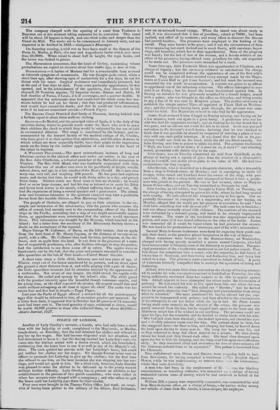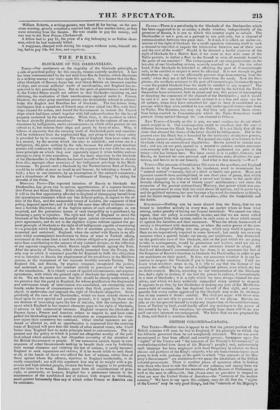POLICE OF LONDON.
Another of Lady Gresley's servants, a female, who had only been a short time with her ladyship as cook, complained to the Magistrate, at Marlbo-rough-street, on Saturday, that she had detained her clothes and refused to pay her up her wages. She had become disgusted with her situation, and had determined to leave it ; but this having reached her Ladyship's ears, she came into the kitchen armed with a drawn sword, which she brandished, exclaiming that she knew how to use it as well as any of his Majesty's soldiers. The cook quitted her service with her Ladyship's leave, but could get neither her clothes nor her wages. Sir George Farrant twice sent an officer to persuade her Ladyship to give up the clothes ; but the first time she refused to see him, on the next occasion she was stepping into her carriage, and would not speak to hint. On a third visit, however, Lady Gres-ley was pleased to order the clothes to be delivered up to the young woman without further difficulty. Lady Gresley has at present an addition to her establishment in the persons of two parish constables, who were called in when her servants were charged with a conspiracy ; and who refuse to quit the house until her Ladyship pays them for their trouble.
Four men were brought to the Thames Police Office last week, on suspicion of having been parties to the robbery of the Albion, East Indianan, now on an outward bound voyage. When the vessel was about ready to sail, it was discovered that a box of jewellery, valued at 7000/., had been opened, and rifled of its contents ; and every effort to discover the thieves had proved fruitless. The prisoners were employed in the loading of the vessel. They were known to im poor ; and it was the circumstance of their wives appearing last week decked out in much finery, with ear-rings, fingerrings, and brooches, which led to their apprehension. None of the property was found ; but the fact of One of the women, and a female relative of another of the prisoners, having offered some jewellery for sale, are expected to be made out. The prisoners were remanded for a week.
Some time ago, John Frederick Miers was apprehended at Clapham, on a charge of bigamy ; but the necessary evidence to substantiate the charge could not be completed without the appearance of one of the first wife's friends. They one and all have resisted every attempt made by the 1VIagistrates at Union Hall to get them forward ; and last week the accused was remanded for the tenth re-examination. A warrant was given to an officer to apprehend one of the refractory witnesses. The officer attempted to execute it on Friday ; but be found the house barricadoed against him. In . forcing an entrance he was grievously assaulted by a female lodger, armed with a poker, who was brought to the office on Saturday, and being unable to pay a fine of I/. was sent to Kingston prison. The parties necessary to establish the charge against Miers all appeared at Union Hall on Wednesday ; and the evidence having been gone through, the prisoner was committed for trial. The Magistrate refused to take bail for his appearance.
James Scott entered Union Chapel on Sunday et:ening, and having sat for a few minutes, went out -again in a great hurry. A gentleman who was beside him had his suspicions excited ; and on lookin,g for his hat found that it was gone, and an old one not worth 6d. left in its stead. Scott was pursued and taken to St. Saviour's watch-house, declaring that he was shocked to think that it was possible he should be suspected of entering a place of worship with any such guilty intention. It was found that the hat in his possession would not stick on his head, while the old one fitted exactly. Sir Joint Perring sent him to prison to abide his trial. The prisoner exclaimed, " Well, the Lord's will be done ; if it must be so, it must I " and wheeling round, proceeded with stately step to the cage.
John Jones, was on Tuesday committed for trial front Guildhall, on the charge of having cut a square of glass from the window of a silversmith's shop in Corithill, and stolen silver plate to the value of 40/. He had two companions, but they escaped.
John Barrett, who is described as a desperate character, stole a tea-caddy from a shop in Oxford-street, an Monday; and in attempting to make his escape, twice struck and knocked down the owner of the shop, who pursued him. He drew a clasp knife and attempted to thrust it into a gentleman who joined in time pursuit. He was at last secured, taken to Mary-lebonne Police-office, and on Tuesday committed to Nett-gate for trial. John Jordan, an old soldier, was brought to Union Hall, on Tuesday, on the charge of having attempted to poison his wife, whom he had long treated with cruelty. He only allowed her twopence aday to live upon. She repeatedly threatened to complain to a magistrate; and on her having, on Monday, alleged that she would put her purpose in execution, he said "You shall have something that will do your job." She took some tea to breakfast ; and was almost instantly seized with sickness. The contents of the stomach were extracted by a stomach pump, and found to be strongly impregnated with arsenic. The water in the tea-kettle was also impregnated with the poison, and some of it was found adhering to the sides of the kettle. Jordan was remanded till it could be found where he had procured the arsenic. He was loud in his protestations of innocence, and of his wife's misconduct.
Several Mary-le-bonne tradesmen were fined for exposing their goods outside their doors, as the practice placed temptation in the way of thieves. Three watertnen were brought to the Mansion-house, on Wednesday, charged with having grossly assaulted a person named Cosgrove, who had been instrumental in bringing some of the fraternity to punishment. The principal particulars of the assault were mentioned in our last police report. They had thrust the complainer into a coach, with the intention, he had heard, of taking him to Norwood, and.then taring and feathering hitn, and tying him naked to a tree. The prisoners were committed in deffiult of bail. A party of watermen formerly compelled him to undergo the operation of taring and feathering.
Abbott, who was some time since arrested on the charge of having attempted to murder his wife, was again examined at Guildhall on Thursday, his wife being sufficiently recovered front her wounds to he able to appear against him. Abbott appears to have attempted the crime under the excitement of jealousy. He had asked his wife to live apart from him, and when she consented he struck her violently. She called out " Murder ;" but he desired her to be quiet, observing that "God Almighty had prevented him from doing what he intended." She next mentioned his having offered her gin, supposed to be impregnated with poison; and then alluded to the circumstance of his attempting to cut her throat while she lay in bed. Sir Peter Laurie having made some remarks on the atrocity of the crime, the prisoner was partly removed from the bar, but he stepped back again to the front and the Alderman asked hint if he wished to say anything. The prisoner could not open his lips, but the constable said he wished to shake hands with his wife. "She had just risen from the chair; she looked upwards, and closed her eyes and a deathly paleness came over her face. She seemed about to faint, but she staggered across the floor to him, and clasping her hand, he bowed down his head upon the bar to weep over it.. She hung her head over his, and so they remained in deep but silent anguish for a minute. He then slowly raised her bead, and they kissed each other. His head then drooped again upon the bar to hide his weeping, and she hung over him again most affection
ately. So they remained silent and motionless for two or three minutes, till the Alderman ordered them to he separated." The pathos is borrowed from the Chronicle.
Two well-dressed men, Dixon and Davies, were yesterday held to bail, front Bow-street, for ,having assaulted a watchman ;:t..the .English Opera House, while he was endeavouringto remove theni from the wine-rooms, where they were disorderly-.
A man who had been in the employment of Mr. ......zrren, the blacking manufacturer, as travelling collector, was remanded au a charge of having embezzled various sums of money, which he had received in behalf of the concern.
William Bill, a young man respectably connected, was committed for trial from Mary-le-bonne office, on a charge of felony,--he having stolen money and articles of dress from Mr. Austin, a linen-draper, his employer.
William Roberts, a writing-painter, was fined 41. for having, on the previous evening, grossly assaulted a married lady and her maiden sister, as they were returning from the theatre. He was unable to pay the money, and was sent to the New Prison, Clerkenwell.
A fellow had to pay 1/., the price of a dog belonging to an Italian showman, which he had wantonly killed.
A waggoner, charged with driving his waggon without reins, himself riding, had to pay 14s. 64. fine, and expenses.



















 Previous page
Previous page